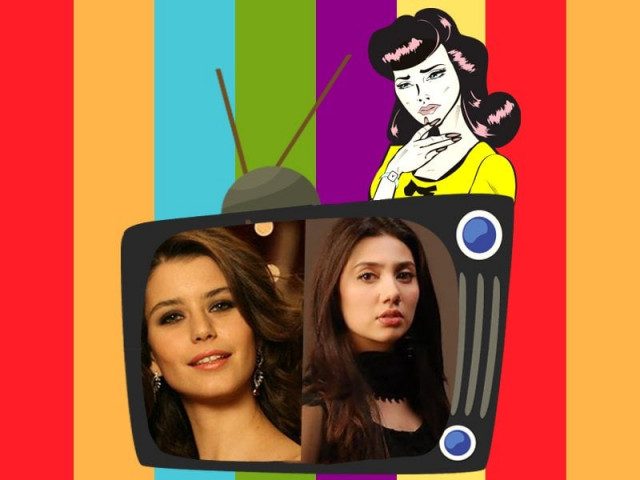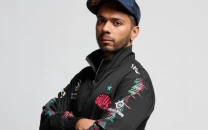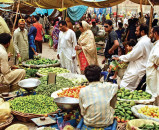Bihter trumps Khirad any day of the week
The Turkish heroine is not the ideal woman, but she has a spine and is a far cry from her Pakistani counterpart.

The Turkish heroine is not the ideal woman, but she has a spine and is a far cry from her Pakistani counterpart.
What kind of heroine would Pakistani audiences rather see on TV?
For the past three months, my mother was vigorously rooting for Team Behlul-Bihter, the adulterous couple that graced our television screens in the 9-10 pm slot, along with images of the scenic Bosporus, pixellated cleavage shots, and lots and lots of orange juice for breakfast. A regular homemaker, my mother has the typical middle-aged Pakistani woman’s outlook towards television soaps: she sympathises with the doormat underdog heroine of local television dramas, and heaps copious anathema upon the western-styled English-spouting husband-stealing vamp who stalks ingenuous men.
And yet, when it comes to these Turkish dramas, her stance takes a 180 degree turn.
Things are no different in living rooms across the country. Such is the power of the tidal wave of Turkish dramas sweeping across our TV channels that aunties, grannies and spinsters have swooned over the charms of Behlul and wept bucket-loads when Bihter finally commits suicide when her cowardly lover refuses to elope with her.
What explains the popularity of these poorly-dubbed shows among our audiences? Of course, the new faces, the European lifestyle and exotic locations in a sleekly produced package are a big draw. But beneath the glamorous surface, don’t these soaps follow nearly the same plots as local shows, with the same family politics, the same rivalries, and the same penchant for eavesdropping to move the story forward? Aren’t the women still pining away after men they love, while domestic violence is still at hand, if somewhat rarer?
But look closer, and you’ll spot a crucial difference. Whereas Pakistani drama ratings are famously proportional to how much the heroine cries, the strong, liberated woman of the Turkish soaps who sets out to get what she wants topples all notions of what a heroine beloved of the Pakistani audiences must behave like. The Turkish heroine is not the ideal woman, but she certainly has a spine and is a far cry from her Pakistani counterpart whose weapon of choice is tears and who cries harder and harder in each subsequent episode to win the audience over.
On the other hand, the heroines in the Turkish dramas aired so far in Pakistan pretty much tend to make their own decisions. They don’t need men, parents, society or their own children to affirm what they do with their lives. There are no status quo-reinforcing characters telling women what kind of behaviour is expected from them “for their own good”.
Another difference is that in these shows, there is no idolisation of men as some kind of unerring, out-worldly deities who are above sin and transgression. No man will parrot the “I am male and therefore I will womanise incessantly” line with bravado. There are thankfully fewer images of the crying woman left at home, while the man philanders around. If anything, women are as actively involved in extramarital affairs as the men. While this is not necessarily an indicator of women’s emancipation, it does break the stereotype that fidelity is a given when it comes to women, while men have a wildcard to be ‘men’ and get away with it, like they do in local soaps.

Most refreshingly, there is no internalisation by the female characters of men as some kind of demigods who must be pleased, whose favour must be won, and whose word is the Final Word. There is no wronged woman, who must suffer in silence, and can only redeem herself by winning the favour of some central male figure. Thankfully, Turkish dramas, by and large, bin the concept that whoever has the ‘man’ on her side is the queen of the world. This is how they do away with the doormat heroine who is used, abused and rises above all by finally winning her husband’s heart.
While Turkish soaps do often feature violence, in all the Turkish soaps that have been aired in Pakistan so far, I have yet to see a woman hit by a ‘nice’ guy. On the other hand, it is quite common to see even the upright hero in Pakistani soaps strike the doormat heroine if she is suspected of infidelity (or, worse still, if she errs in performing her housework ... intolerable!). There is no bashing of women without consequence, and in contrast to what happens in local soaps, men do not just slap and shove women, and get away with it by mouthing a measly apology.
Then, there are no women being nasty witches just for the heck of it, simply to make the lives of other women in the household miserable. Rather they have real, tangible motives which makes the plot more credible. If a woman is being evil, it is safe to assume that it is to a purpose (like greed for money) than just winning a man’s affections; or worse, some kind of botched reverse Oedipus complex, a la Humsafar.
Very crucially, there is no depiction of polygamy as a perfectly acceptable, religiously-sanctioned arrangement in Turkish dramas. Rather, Turkish soaps show love triangles involving one man and two women to be serious, irreconcilable problems. In our drama serials, the ‘one man-two wives’ scenario is treated as something almost normal and quite common, which is resolved by the old wife coming around to the new wife; the debate is usually about how well the women come to terms with the arrangement. Also, in Pakistani dramas, polygamy happens when the ‘good’ boy is lured by the ‘bad, western’ girl. If, on the other hand, a married woman has feelings for someone else, then she has to be a ‘bad’ girl to begin with. The same is not true for men: married men may initiate affairs without being ‘bad’ by default.
While debate on the Turkish dramas currently raging across Pakistan focuses on the skin show and alcohol consumption, I think it is actually the empowered woman of Turkish serials that secretly scares our men. I say this because most of them seem to be okay with bare midriffs and more in Indian soaps and films that promote the retrogressive mindset where the good girl/bad girl demarcation is very black-and-white. On the other hand, Turkish soaps with their liberated (yet Muslim) women challenge our social insecurities and push the boundaries. They might be a fad, evaporating by the next season, but they will hopefully raise the bar for the portrayal of the ‘ideal’ woman from homely doormat to a more emancipated individual. Maybe the sequel of Humsafar will feature a Khirad who takes a few notes from Bihter, and walks out on her husband next time he shoves her to the floor in a fit of rage.
Published in The Express Tribune, Ms T, January 27th, 2013.
Like MsT on Facebook for your dose of girl talk.



















COMMENTS
Comments are moderated and generally will be posted if they are on-topic and not abusive.
For more information, please see our Comments FAQ